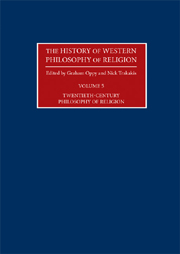Book contents
- Frontmatter
- Contents
- Editorial Introduction
- Contributors
- 1 Twentieth-Century Philosophy of Religion: An Introduction
- 2 William James
- 3 Henri Bergson
- 4 John Dewey
- 5 Alfred North Whitehead and Charles Hartshorne
- 6 Bertrand Russell
- 7 Max Scheler
- 8 Martin Buber
- 9 Jacques Maritain
- 10 Karl Jaspers
- 11 Paul Tillich
- 12 Karl Barth
- 13 Ludwig Wittgenstein
- 14 Martin Heidegger
- 15 Emmanuel Levinas
- 16 Simone Weil
- 17 A. J. Ayer
- 18 William P. Alston
- 19 John Hick
- 20 Mary Daly
- 21 Jacques Derrida
- 22 Alvin Plantinga
- 23 Richard Swinburne
- 24 Late-Twentieth-Century Atheism
- Chronology
- Bibliography
- Index
7 - Max Scheler
- Frontmatter
- Contents
- Editorial Introduction
- Contributors
- 1 Twentieth-Century Philosophy of Religion: An Introduction
- 2 William James
- 3 Henri Bergson
- 4 John Dewey
- 5 Alfred North Whitehead and Charles Hartshorne
- 6 Bertrand Russell
- 7 Max Scheler
- 8 Martin Buber
- 9 Jacques Maritain
- 10 Karl Jaspers
- 11 Paul Tillich
- 12 Karl Barth
- 13 Ludwig Wittgenstein
- 14 Martin Heidegger
- 15 Emmanuel Levinas
- 16 Simone Weil
- 17 A. J. Ayer
- 18 William P. Alston
- 19 John Hick
- 20 Mary Daly
- 21 Jacques Derrida
- 22 Alvin Plantinga
- 23 Richard Swinburne
- 24 Late-Twentieth-Century Atheism
- Chronology
- Bibliography
- Index
Summary
Max Scheler was born in 1874 in Munich, Germany and died at the early age of fifty-four in 1928. During the last fifteen years or so of his life, Scheler was widely regarded as “the most brilliant thinker of his day,” according to Bochenski (1961: 140). ‘His day’ is roughly from 1912 until his death in 1928.
Scheler focused on two main areas in his most influential publications, from 1912 to 1920. One was describing the essence of our emotional consciousness of values, such as a special sort of love: an act of loving the holy person, God; a loving act in which the value of holiness originally appears. The other is the study of the religious consciousness, or the religious act of ‘faith’, with faith viewed as a reactive response to the self-disclosure of the holy person (God).
Scheler's philosophical writings began with his 1899 doctoral degree under the neo-Kantian Rudolf Eucken, who believed that the nature of the philosopher's task is to discover the eternal realm of values. This view exercised a lifelong influence on Scheler.
The second most important influence on Scheler arose from his meeting ‘the father of phenomenology’, Edmund Husserl, in 1910. Scheler quickly became the most creative of the many followers of Husserl, and by 1918 or 1920 Scheler was considered by many German phenomenologists to have superseded him.
- Type
- Chapter
- Information
- The History of Western Philosophy of Religion , pp. 79 - 90Publisher: Acumen PublishingPrint publication year: 2009

